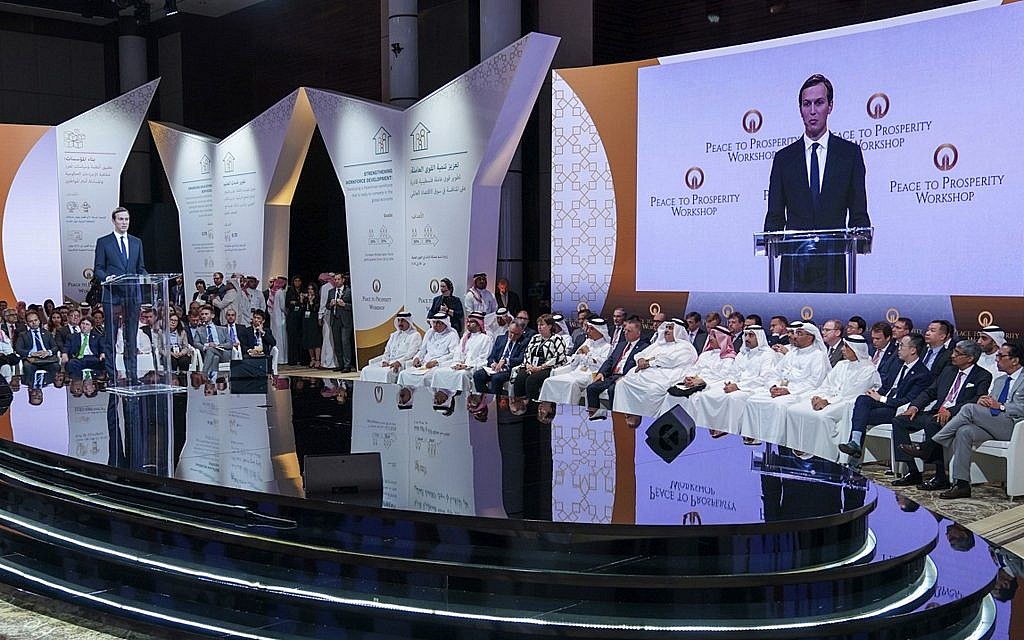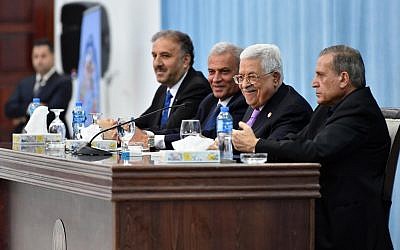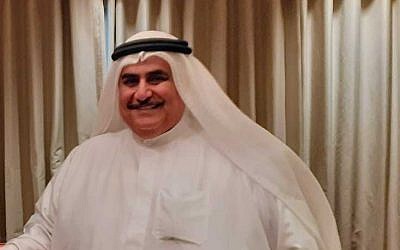They didn’t heed PA’s call to boycott Kushner’s Manama economic workshop, but Mideast participants made plain the US political vision must enable some kind of Palestinian statehood

One week after the economic workshop in Bahrain, American and Palestinian officials, predictably, have very different views on the event, which was billed as the rollout of the first part of the White House’s much anticipated peace proposal.
“The Peace to Prosperity workshop in Bahrain was a success, with international participation that surpassed expectations,” Jason Greenblatt, US President Donald’s Trump’s Middle East envoy, told The Times of Israel this week.
“We were overwhelmed by the response that we got,” Jared Kushner, Trump’s senior advisor, added in a conference call with reporters Wednesday. “Every country that we invited showed up, and we had a very, very big crowd. We got a lot of very senior business leaders from all throughout the world, all the great companies.”
The Palestinians, who boycotted the event, unsurprisingly denounced it as a colossal failure that produced little but verbiage.
“It came and went. It ended. Some Arabs attended and some did not. Some Europeans attended and some did not,” Palestinian Authority President Mahmoud Abbas said Wednesday. “It is a big lie that Kushner and others invented to make fools of the people. Nobody makes fools of us.”
So far, so foreseeable. But what, if any, concrete results were achieved in Manama, remains as hazy as the contours of the forthcoming political part of the so-called Deal of the Century.
But Bahrain did make one thing clear: As of now, even those who are favorable to the Trump administration’s peace push believe that a final-status deal must provide for some sort of Palestinian state.
Many in the Arab world were, and remain, skeptical, to put it mildly, about the White House’s approach to the Israeli-Palestinian conflict — and yet an impressive number of senior Arab dignitaries attended the Bahrain workshop.

Ramallah was hoping for those countries it regards as its allies to join its boycott, but Egypt, Saudi Arabia, the United Arab Emirates and others showed up, lending credibility to the administration’s peace efforts, and allowing Kushner and Greenblatt to present the workshop as a smash hit.
Nonetheless, in the hallways of Manama’s Four Seasons hotel, where the workshop took place last Tuesday and Wednesday, many participants made plain their conviction that the whole peace plan will fail spectacularly if it does not offer the Palestinians some sort of statehood — if not full sovereignty, then at least a “state minus.” Anything but a two-state is worth nothing, many people in and around the workshop agreed.

Even Bahraini Foreign Minister Khalid bin Ahmad Al Khalifa, who made headlines for his exceptionally pro-Israel statements, notably in an interview with this reporter and other Israeli media, reiterated his country’s support for a two-state solution.
“We support a Palestinian state on June 4, 1967 lines with East Jerusalem as its capital with full sovereignty and full rights for the Palestinian people. This is our position and it has not changed,” he told the Saudi-owned Al-Arabiya news channel a day after the conference ended.
On Tuesday, in a briefing with senior Bahraini defense and foreign affairs officials, Khalifa spoke of the workshop’s “fruitful results,” but affirmed his government’s support of the Palestinians’ right to an independent state “with Al-Quds [Jerusalem] as its capital.”
Former UK prime minister Tony Blair, who was interviewed onstage by Kushner as the workshop came to a close last Wednesday evening, repeated his position several times: “I remain a believer in the two-state solution; a believer in the legitimate aspirations of the Palestinian people for a state.” (Kushner listened impassively.)
The European Union’s Special Representative for the Middle East Peace Process, Susana Terstal, who attended the Manama workshop, also reiterated that a two-state solution was the only way forward.
In private conversations at the sidelines of the conference, even staunch supporters of Israel surmised that the detailed nature of the economic plan — which, over 140 pages, proposes some 175 projects and programs to improve the quality of life in the West Bank and Gaza — indicates that the political part that will now follow is likely to propose some sort of Palestinian statehood.
Meanwhile Trump ally Lindsay Graham, a hawkish Republican senator from South Carolina who visited Israel this week, said he too opposes any peace plan that does not end with two states for two peoples.
“As you look to the future, the way to ensure a Jewish state that is democratic and recognizes the rights of its people is to certainly not have a one-state solution,” he said at a press conference in Jerusalem Wednesday. “And that means having a two-state solution.”
Graham added: “I will not invest a dime in a situation that results in one-state.”
It remains unclear if the administration is listening.
Asked what, if any, changes to the peace plan it plans on making in the wake of Bahrain, Greenblatt told The Times of Israel this week: “We will continue our process of collecting technical and constructive feedback on the economic vision in order to help inform the finalized version of the economic plan.”
Kushner, on his conference call with reporters Wednesday, said that he and his team left Manama with “some new ideas and some good constructive feedback from people on the economic plan.” He did not say whether what he heard at the workshop on the need for a two-state solution would find any expression in the political part of the plan.
But he did indicate that we may find out very soon. “We’ll be announcing probably next week what our next steps are going to be,” Kushner said, “and then we’ll keep pushing forward.”
As reported by The Times of Israel
